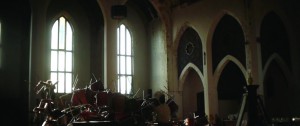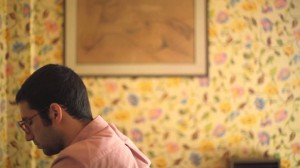Simple Machine & Micro-Wave: Building a Grassroots Film Community

THE MEN OF DODGE CITY, directed by Nandan Rao
Filmmaker Nandan Rao launched Simple Machine in March 2013 at SXSW. The goal of the site is to facilitate the public exhibition of microbudget (<$100K) films – most of which are never screened for public audiences after their festival runs – by directly connecting filmmakers to audiences. Though there is a possibility for filmmaker/distributor profit within the Simple Machine model (via ticket revenue), the primary function of the service is to foster a grassroots network of communities (exhibition sites, programmers, and cinephiles) that are passionate about truly independent cinema. It has now been a year since the site began offering its services, carrying a library of films by directors such as Joe Swanberg, Dustin Guy Defa, Robert Greene, and Amy Seimetz. While there have been dozens of one-off screenings along the way, a consistently operating venue or screening series has not arisen. I intend to change that.
If Simple Machine’s potential is to be fulfilled, it is necessary to create pockets of strong local interest. Right now, there are only a few areas where you can see many of these movies in a public setting – New York City, Austin, Chicago, occasionally Los Angeles or Seattle – and there is the Internet, where microbudget cinema has found a home. The challenge, it seems, is to generate new physical outposts for a mostly online community. Ideally, these physical outposts would grow local audiences, which would then feed back into and expand the overall network. People actually talking about films with other people can be quite powerful.
The Micro-Wave Film Series (“micro” budget + new “wave”) is my attempt to give concrete form to the hypothetical promise contained within Simple Machine. Every screening takes place in a fantastic UW-Madison campus theater, is free, and involves a Q & A session with the filmmaker(s) afterward. Sounds great, right? Well, as of now, people are not coming. Community building requires the slowness and steadiness of the proverbial tortoise. However, someone has to take the first big step. If anything, taking that first step has taught me how difficult it can be to create and/or mobilize an audience, especially when relying on the Internet.
In my case, for example, we have garnered 170 likes on our Facebook page. Facebook tells me that 60 of those are Madison residents. Not a ton of fans, but if even 25% of those Madison fans showed up to each screening, we would be pulling in about 15 audience members at each screening. Terrific! However, these are the actual attendance figures for our four screenings thus far this semester: 18, 7, 4, and 3. Indeed, Facebook also tells me that we only have 10 “engaged” fans located in Madison. So much for all those sponsored posts.
To be fair, these early stumbles are likely due to my lack of experience as a promoter, not just the inefficiencies of Facebook advertising. I only decided to do the series in January, so I have been flying by the seat of my pants. Hopefully, more planning time and experience will result in more efficacious publicity. These sorts of difficulties, however, extend beyond my specific circumstance. The challenges of audience building and mobilization seem endemic to public film exhibition outside of a traditional theatrical setting, especially with films that lack mainstream stars and significant advertising budgets. Depressingly, way more people will come out for a campus screening of the new Thor film than a screening of a film they might not be able to see anywhere, anytime, anyhow, even with the bonus of special access to the filmmakers. How does an upstart exhibition organization effectively attract and reward viewers, especially when the films are produced by total independents? This question is interesting to me not just as a budding programmer and exhibitor, but also as a filmmaker and, most pertinent to this blog, an academic. I imagine my understanding will grow along with my experience. I hope to deliver progress reports to Antenna in the future.

THE INTERNATIONAL SIGN FOR CHOKING, directed by Zach Weintraub, kicked off Micro-Wave in Madison.
Of course, Micro-Wave, has also been a relative success. Our first screening, a double feature of films by Zach Weintraub, was well-attended and well-received. Though subsequent screenings have had lower attendance, audience members have expressed enthusiasm for the films and our Q & As have been candid, informative, and very conversational. Beyond our Madison audience, we have received great feedback from other filmmakers, critics, and miscellaneous participants in the microbudget community. A few of them have even told me that they intend to start their own local chapters of Micro-Wave, which I wholeheartedly support. Importantly, Micro-Wave is also serving as a major testing ground for the Simple Machine model. Screening the films has required me to exchange films in various forms (mailed Blu-ray discs, mailed flash drives, Vimeo downloads, Dropbox downloads, BitTorrent peer-to-peer sharing) and to manage physical Q & As, Skype Q & As and Google Hangouts. To me, Micro-Wave (particularly this first semester) is like beta testing for what Simple Machine will eventually become. Hopefully, it will be something transformative.

Ian Clark’s MMXIII
On Sunday, March 30 @ 7:00 PM, Micro-Wave will be screening Ian Clark’s MMXIII (2013), followed by a Skype Q & A with the director. On Sunday, April 13 @ 7:00 PM, Micro-Wave will present a double feature of films by Kris Swanberg, with the director in attendance: IT WAS GREAT, BUT I WAS READY TO COME HOME (2009) and EMPIRE BUILDER (2012).



[…] At UW’s “Antenna” Blog, Brandon Colvin discusses the rewards and challenges of his grassroots “Micro-Wave Cinema” program: […]